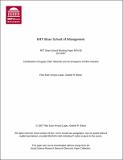| dc.contributor.author | Arroyo-López, Pilar Ester | |
| dc.contributor.author | Bitran, Gabriel R. | |
| dc.date.accessioned | 2008-01-11T17:50:55Z | |
| dc.date.available | 2008-01-11T17:50:55Z | |
| dc.date.issued | 2008-01-11T17:50:55Z | |
| dc.identifier.uri | http://hdl.handle.net/1721.1/40083 | |
| dc.description.abstract | Abstract
Companies recognize international sourcing as a business practice useful to reduce
product prices, deal with supply shortages and identify new competitive suppliers.
Effective international sourcing implies the integration and coordination of
materials, processes, information flows and multiple producers at each buying
location. Many companies do not have the capabilities or the willingness to develop
and manage such sourcing networks; therefore, other entities have assumed these
responsibilities. These coordinators are in charge of the integration of many
suppliers to develop full-package production, serve as liaisons between suppliers’
capabilities and market demands, and provide the technical and financial support to
sustain the sourcing network. The review of the industrial clustering and global
supply chain literature allowed the identification of such coordinators in Mexico.
The emergence and profile of these coordinators is associated with corporate
strategies of multinational firms, the efforts of industrial groups, and the
governmental policies for the development of dynamic industrial regions. This paper
analyzes the characteristics of four coordination models identified in the Mexican
context, focusing on their contribution to the participation and upgrading of national
suppliers. The profile of the coordinator firm, the type of relations that this firm
sustains with producers and the support offered to suppliers is also discussed. A
particular emphasis is given to the fourth model where a third party, a knowledge
and service company, assumes the coordinator role. The interest on this model is
due to its novelty, the flexibility of the sourcing network, and the potential impact
on regional development that could result from the intervention of a neutral third
party as coordinator of the activities of multiple local and specialized suppliers. | en |
| dc.language.iso | en_US | en |
| dc.relation.ispartofseries | MIT Sloan School of Management Working Paper | en |
| dc.relation.ispartofseries | 4674-08 | en |
| dc.subject | Supply chain coordination | en |
| dc.subject | industrial clustering | en |
| dc.subject | global supply chain | en |
| dc.subject | supplier upgrading | en |
| dc.subject | advanced logistics services | en |
| dc.title | Coordination of Supply Chain Networks and the Emergence of Mini-maestros | en |
| dc.type | Working Paper | en |
